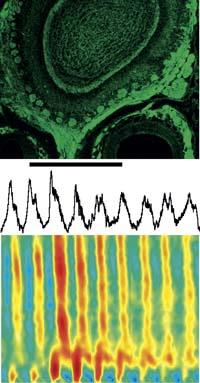2009/02/01
250. zenbakia

eu es fr en cat gl
Aparecerá un contenido traducido automáticamente. ¿Deseas continuar?
Un contenu traduit automatiquement apparaîtra. Voulez-vous continuer?
An automatically translated content item will be displayed. Do you want to continue?
Apareixerà un contingut traduït automàticament. Vols continuar?
Aparecerá un contido traducido automaticamente. ¿Desexas continuar?
Prions influence the smell
Text created by automatic translator Elia and has not been subsequently revised by translators.
Elia Elhuyar
Prions influence the smell
01/02/2009 | Elhuyar

Above, the olfactory mouse bulb. Below is how the information is processed.
C. C. Le Pichon & M. Valley/Nature neuroscience
Researchers at the University of Columbia have found that prions influence the olfactory system. Prions are not essential in smell, but they have been shown to strictly maintain the capacities of this sense.
During a study with mice by electrophysiologist Stuart Firestein and his team, large amounts of prions were found in his olfactory system. With the aim of clarifying their function, some mice were genetically treated to avoid having prions. Thus, they saw that common mice found food faster than those without prions, and these did not separate odors.
It is known that the prion, denatured, is the cause of the disease of mad cows and other neurodegenerative diseases. But this research has clarified that it can be important for the survival of animals in a folded and spontaneous way.
1.
250 250 250 250 250
2009 2009 2009 2009 2009
Services Services Services
024 024 024
Biochemistry Biochemistry
News in brief brief
Results Results Results






